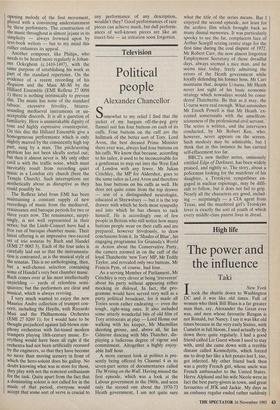Television
Political people
Alexander Chancellor
Somewhat to my relief I find that the jacket of my bargain off-the-peg grey flannel suit has four buttons on each of its cuffs. Four buttons on the cuff are the hallmark of the better sort of Tory. Lord Avon, the best dressed Prime Minister there ever was, always had four buttons on his cuffs. We know that because, according to his tailor, it used to be inconceivable for a gentleman to step out into the West End of London with any fewer. Mr Julian Critchley, the MP for Aldershot, goes to the same tailor as Lord Avon and therefore has four buttons on his cuffs as well. He does not quite come from the top drawer — son of a distinguished neurologist, educated at Shrewsbury — but it is the top drawer with which he feels most sympathy and into which he has chosen to tuck himself. He is accordingly one of few people in Britain who still notice how many buttons people wear on their cuffs and are prepared, however frivolously, to draw conclusions from it. In 'Shades of Blue', his engaging programme for Granada's World in Action about the Conservative Party, the camera zoomed in on the cuff of the loyal Thatcherite `new Tory' MP, Mr Teddy Taylor, and revealed only two buttons. Mr Francis Pym, of course, had four.
As a serving Member of Parliament, Mr Critchley is very clever at being `irreverent' about his party without appearing either mocking or disloyal. In fact, the pro- gramme would have served very well as a party political broadcast, for it made all Tories seem rather endearing — even the tough, right-wing ones. It also included some utterly wonderful bits of old film of Tory aristocrats at play — Lord Home out walking with his keeper, Mr Macmillan shooting grouse, and, above all, Sir Ian Gilmour dancing with Mrs Thatcher, dis-. playing a ludicrous degree of vigour and commitment. Altogether a highly enjoy- able half hour.
A more earnest look at politics is pre- sently being offered by Channel 4 in its seven-part series of documentaries called The Writing on the Wall. Having missed the first episode, which was a look at the Labour government in the 1960s, and seen only the second one about the 1970-73 Heath government, I am not quite sure what the title of the series means. But I enjoyed the second episode, not least for the archive film which brought back so many dismal memories. It was particularly spooky to see the fat, complacent face of Arthur Scargill seizing centre stage for the first time during the coal dispute of 1972. Mr Robert Carr, the now almost forgotten Employment .Secretary of those dreadful days, always seemed a nice man, and he seems nice today, freely admitting the errors of the Heath government while loyally defending his former boss. Mr Carr maintains that, despite U-turns, Mr Heath never lost sight of his basic economic strategy which nowadays would be consi- dered Thatcherite. Be that as it may, the U-turns were real enough. What astonishes Mr Enoch Powell is that Mr Heath `ex- ecuted somersaults with the unselfcon- sciousness of the professional civil servant.' The series is written, and the interviews conducted, by Mr Robert Kee, who, however, never appears on the screen. Such modesty may be admirable, but I think that in this instance he has carried self-effacement too far.
BBC2's new thriller series, ominously entitled Edge of Darkness, has been widely praised, and rightly so. The story, about a policeman looking for the murderer of his daughter, a Trotskyist sympathiser en- gaged in nuclear espionage, may be diffi- cult to follow, but it does not fail to grip. Nearly all the characters are good, includ- ing — surprisingly — a CIA agent from Texas, and the murdered girl's Trotskyist lover is exactly the sort of youth of which every middle-class parent lives in dread.


































































 Previous page
Previous page